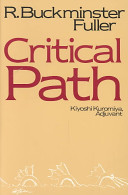Malthus > Darwin > Marx
In 1800 Thomas Malthus, later professor of political economics of the East India Company College, was the first human in history to receive a comprehensively complete inventory of the world's vital and economic statistics. The accuracy of the pre-Trafalgar 1800 inventory was verified by a similar world inventory taken by the East India Company in 1810. In a later—post-Trafalgar—book Malthus confirmed in 1810 his 1800 finding that world-around humanity was increasing its numbers at a geometrical progression rate while increasing its life-support production at only an arith¬ metical progression rate, ergo, an increasing majority of humans would have to live out their short years in want and misery.
"Pray all you want," said Malthus, "it will do you no good. There is no more!"
A half-century later Darwin expounded his theory of evolution, assuming that nature's inexorable processes were the consequence of the "survival only of the fittest species and individuals within those species."
Karl Marx compounded Malthus's and Darwin's scientifically convincing conclusions and said, in effect, "The worker is obviously the fittest to sur vive. He is the one who knows how to handle the tools and seeds to produce the life support. The opulent others are 'parasites.'" The opulent others said, "We are opulent and on top of the heap because we demonstrate Dar¬ win's 'fittest to survive.' The workers are dull and visionless. What is needed in this world is big-thinking enterprise, courage, cunning, and fighting skill." For the last century these two ideologies, communism and free enterprise, have dominated the political affairs of world-around humanity. Each side says, "You may not Hke our system, but we are convinced that we have the fittest, fairest, most ingenious way of coping with the lethal inadequacy of life support operative on our planet, but because there are those who disagree diametrically on how to cope, only all-out war can resolve which system is fittest to survive."
Those in supreme power pohtically and economically as of 1980 are as yet convinced that our planet Earth has nowhere nearly enough life support for all humanity. All books on economics have only one basic tenet—the fundamental scarcity of life support. The supreme political and economic powers as yet assume that it has to be either you or me. Not enough for both. That is why (1) those in financial advantage fortify themselves even further, reasoning that unselfishness is suicidal. That is why (2) the annual military expenditures by the U.S.S.R., representing socialism, and the U.S.A., representing private enterprise, have averaged over $200 billion a year for the last thirty years, doubling it last year to $400 billion—making a thus-far total of six trillion, 400 biUion dollars spent in developing the abil ity to kill ever-more people, at ever-greater distances, in ever-shorter time.
Notes:
The train of ideas that lead to the Communism/Capitalism view of the world.
Folksonomies: communism capitalism worldview
Taxonomies:
/law, govt and politics/government (0.511305)
/food and drink (0.417831)
/law, govt and politics/politics/political parties (0.378738)
Keywords:
East India Company (0.923334 (positive:0.211354)), life support (0.823007 (negative:-0.064219)), comprehensively complete inventory (0.629966 (positive:0.488525)), similar world inventory (0.615229 (positive:0.211354)), India Company College (0.614672 (neutral:0.000000)), arith¬ metical progression (0.603891 (neutral:0.000000)), geometrical progression rate (0.601526 (neutral:0.000000)), Malthus (0.568779 (positive:0.470076)), annual military expenditures (0.560596 (neutral:0.000000)), Thomas Malthus (0.560461 (neutral:0.000000)), life support operative (0.556933 (negative:-0.563458)), fittest species (0.546384 (neutral:0.000000)), later—post-Trafalgar—book Malthus (0.535039 (neutral:0.000000)), Communism/Capitalism view (0.434791 (neutral:0.000000)), life-support production (0.434043 (neutral:0.000000)), Marx The train (0.433875 (neutral:0.000000)), later professor (0.426679 (neutral:0.000000)), economic statistics (0.426262 (positive:0.488525)), political economics (0.423091 (neutral:0.000000)), Karl Marx (0.409617 (positive:0.470076)), all-out war (0.407879 (negative:-0.407700)), world-around humanity (0.405532 (neutral:0.000000)), Dar¬ win (0.403908 (positive:0.810036)), ingenious way (0.402930 (negative:-0.563458)), fundamental scarcity (0.400085 (positive:0.359703)), financial advantage (0.397027 (positive:0.315733)), lethal inadequacy (0.396926 (negative:-0.563458)), big-thinking enterprise (0.395050 (neutral:0.000000)), free enterprise (0.393166 (positive:0.224393)), political affairs (0.392921 (neutral:0.000000))
Entities:
Thomas Malthus:Person (0.841845 (positive:0.470076)), Darwin:OperatingSystem (0.447266 (positive:0.470076)), East India Company College:Organization (0.353113 (neutral:0.000000)), East India Company:Company (0.341431 (positive:0.211354)), Karl Marx:Person (0.308213 (positive:0.470076)), professor:JobTitle (0.283050 (neutral:0.000000)), U.S.A.:Country (0.272061 (neutral:0.000000)), theory of evolution:FieldTerminology (0.263902 (neutral:0.000000)), $200 billion:Quantity (0.263902 (neutral:0.000000)), $400 billion:Quantity (0.263902 (neutral:0.000000)), thirty years:Quantity (0.263902 (neutral:0.000000))
Concepts:
Karl Marx (0.967360): dbpedia | freebase | opencyc | yago
Economics (0.819115): dbpedia | freebase | opencyc
Political economy (0.774927): dbpedia | freebase | opencyc
Capitalism (0.758083): dbpedia | freebase | opencyc
Communism (0.616371): dbpedia | freebase | opencyc
Geometric progression (0.602304): dbpedia | freebase
Marxism (0.541080): dbpedia | freebase | opencyc | yago
Adam Smith (0.539962): dbpedia | freebase | opencyc | yago





